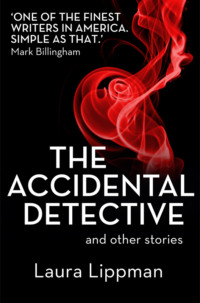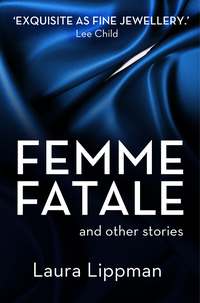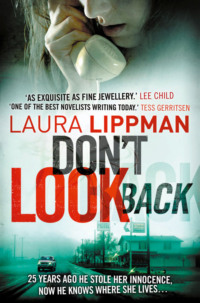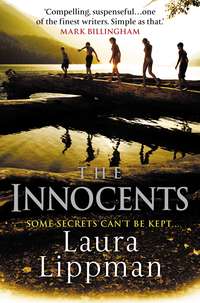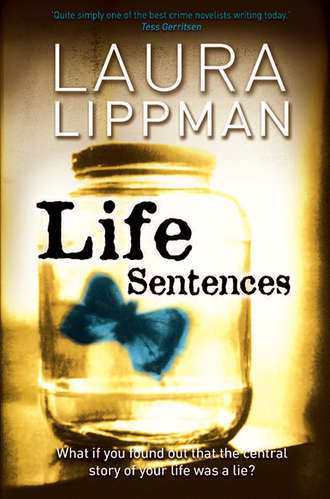
Полная версия
Life Sentences
‘No, in my class. Callie Jenkins. At Dickey Hill, starting in fourth grade. She’s in one of the photographs. She wore her hair in three fat braids, with those little pompon things on the ends.’
Cassandra bunched up a fistful of her own hair to jog her mother’s memory.
‘Three—oh, she must have been black.’
‘Mother.’
‘What? There’s nothing bigoted in saying that. Unless you’re me, I guess. I’m not allowed to notice the color of anyone’s skin.’
Cassandra had no desire to lecture her mother. Besides, she had a point.
‘At any rate, I was watching CNN and there was a story about this case in New Orleans—a woman’s child is missing and she took the Fifth, refused to say where the child is. Someone said it was similar to a case here years ago, involving Calliope Jenkins. It has to be the same person, don’t you think? The age is about right, and how many Calliope Jenkinses could there be in Baltimore?’
‘More than you might think.’
Cassandra couldn’t tell if her mother was being literal or trying to make some larger point about infanticide or her hometown. ‘Don’t you think that would make a good book?’
Her mother pondered. That was the precise word—she puckered her forehead and considered the question at hand as if she were Cassandra’s literary agent or editor, as if Cassandra could not go forward without her mother’s blessing.
‘True crime? That would be different for you.’
‘Not exactly true crime. I’d weave the story of what happened to Callie as an adult with our lives as children, our time in school together. Remember, she was one of the few girls who went to junior high with me.’
‘One of the few black girls,’ her mother said with a look that dared Cassandra to correct her for referencing Callie’s race.
‘Well, yes. And race is a small part of the story, I guess. But it’s really Callie’s story. If I can find her.’
‘Even if you do find her, can she speak to you? I remember the case—’
‘You do?’
‘Anyone who lived here at the time would remember.’ Was there an implicit rebuke in her mother’s words, a reminder that Cassandra had disappointed her by moving away? ‘I didn’t recognize her name, but I remember when it happened. The whole point was that she wouldn’t talk. But if she did kill her child, she can still be charged. If she didn’t, why didn’t she cooperate all those years ago?’
Cassandra was well aware of this particular problem; her editor had raised it first. They had agreed the book wouldn’t be dependent on a confession, or even answering all the questions, but the reader would need to believe that Cassandra had reached some kind of conclusion about her old school friend. Old school friend was the editor’s term, and while Cassandra had initially tried to correct the impression, using classmate and acquaintance, she soon gave up. What was a ‘friend’, after all, when you were ten or eleven? They had played together at school, gone to birthday parties together.
‘I can’t plan this book in advance. That’s what makes it exciting. With the first two books, they were already constructed, in a sense. I had lived them, I just didn’t know how I would write them. And they were very solitary enterprises. Solipsistic, even. But this time—I’m going to interview Callie, once I find her, but also other girls from the class. Tisha, Donna, Fatima. And Callie’s lawyer, I guess, and the police detective who investigated her…heavens, I’m not sure three months here will be enough.’
‘And, of course,’ her mother said, staring into her tea, ‘you’ll be here for all the hoo-haw surrounding your father.’
‘One event in a week of events,’ Cassandra said. ‘A simple onstage interview, and I’m doing it only because it will raise money for the Gordon School’s library building fund. We do owe the school a great debt. Besides, it will be interesting, interviewing Daddy in front of a captive audience. He’s the king of digressions.’
‘Yes,’ her mother said. ‘Your father loved digressing.’
‘It’s not a big deal,’ Cassandra said. She wished, as she often did, that they were a family comfortable with casual touches, that she could place her hand over her mother’s now.
‘I know,’ her mother said. ‘I just hate the way he…romanticizes what he did, to the point where he won’t even talk about it. Or her.’
Cassandra respected her mother for holding on to that ‘Or her’ for all these years, refusing to say Annie’s name unless forced. It might not be particularly healthy, but it was impressive. Cassandra shared her mother’s talent for grudges—it was, she liked to say in speeches, a useful quality for the memoirist, the ability to remember every slight, no matter how small. They called it their Hungarian streak, a reference to her mother’s mother, who had gone thirty years without speaking to her son and lived just long enough to see her granddaughter immortalize this fact in her first book. Nonnie hadn’t minded, not in the least. It had given her a little bit of cachet in the retirement center where she lived, largely indifferent to her neighbors. On what would prove to be Cassandra’s last visit with her, Nonnie had insisted on going to the dining hall, parading her successful granddaughter past the other residents: ‘My granddaughter, she’s a writer, a real one, a bestseller.’ Cassandra wasn’t sure if her grandmother had even read the book in which she took such pride; the volumes—only one book then, but Nonnie had purchased the hardcover and paperback—stood on a table in her apartment. They were, in fact, the only books in the apartment, perhaps the only books her grandmother had ever owned. Nonnie had been mystified, but proud, when her daughter had married a learned man, as she called him. And, true to her own unfathomable principles about loyalty, she continued to like Cedric Fallows even after he betrayed her daughter.
‘I’ve never understood,’ Cassandra said at that last lunch, ‘why you could forgive my father but not your own son. What did he do?’
Her grandmother waved the question away, as she had repeatedly while Cassandra was working on My Father’s Daughter. ‘Pfftt. I don’t talk to him and I don’t talk of him.’
‘Okay, but what Daddy did was pretty bad. Does that mean Uncle Leon did something even worse?’
‘Your father, Uncle Leon…who knows?’
‘Someone must know.’
‘It doesn’t matter. The book is good.’ Meaning: It sold a lot of copies. ‘It doesn’t have to be true. War and Peace isn’t true.’
‘My book is true, Nonnie. It’s a memoir, I made a point to get everything right.’
‘But you can only get things as right as people let you.’
‘Are you mad that I told the story about Uncle Leon and you? I asked your side.’
Nonnie pointed a fork at her. ‘I know how to be mad at people and if I were mad, you wouldn’t be here.’
A month later, she was dead. Cassandra was surprised to see her father at the funeral, more surprised that he had the tact not to bring Annie. He seldom went anywhere without her. Still, when the rabbi invited people up to share their thoughts, Cedric simply couldn’t resist getting up to say a few words, awkward as that was. Uncle Leon didn’t get up, nor did Cassandra’s mother, but the son-in-law who long ago ceased to be a son-in-law waxed eloquent about a woman he had never much liked.
Later, at a brunch in her mother’s house, Cassandra ventured to her father, ‘Nonnie said I didn’t know the truth of the things I wrote, that I got them wrong.’ They were alone, by the buffet table, and she was struck by the novelty of having him to herself.
‘Nonnie was the queen of the mind-fuckers,’ her father said, spearing cold cuts. ‘Do you know why she was so angry at your uncle Leon?’
‘No, she would never tell me.’
‘That’s because she couldn’t remember. He did something thirty years ago that pissed her off, but she would never tell him what it was. Then she forgot. She forgot the precipitating incident, but she never forgot the grudge. Your uncle Leon was desperate to apologize, but he never knew what he did. Your mother used to go visit her and try to guess what Leon did, so he might make amends, and your grandmother would say, “No, that’s not it,” like some Alzheimer’s-addled Sphinx or a Hungarian Rumpelstiltskin, forcing the princess to guess his name when he didn’t know it himself.’
Could it really be? Cassandra decided she believed him, although her father had never let the facts get in the way of a good story.
‘Those are your mother’s people, Cassandra,’ her father said. ‘Thank God you take after me.’
Now, more than a decade later, her mother was saying, ‘Thank God you take after me, Cassandra. In your resilience. You’ll come back from this, I’m sure of it.’
‘From what?’
‘Well—I just mean that I think you’re right, this next book could be something special.’
Her mother did not mean to suggest Cassandra was a failure. Lennie simply couldn’t escape the context of her own life, which she saw as a series of mistakes and disappointments. Yet she had actually enjoyed a brief burst of local celebrity when Cassandra was in high school, appearing on a chat show as ‘Lennie the handywoman’, demonstrating basic repairs. That was when she had started to wear overalls and painter’s caps, much to her teenage daughter’s chagrin.
A more ambitious woman might have parlayed this weekly segment into an empire; after all, the cohost of People Are Talking was a bubbly young woman named Oprah Winfrey. Years later, when Cassandra took her place on Oprah’s sofa, she had asked during the commercial break if Oprah remembered the woman who had provided those home repair tips, the one with the short sandy hair. Oprah said she did, and Cassandra wanted to believe this was true. Her mother had always been easily overlooked, which was one reason she had been enthralled with vivid, attention-grabbing Cedric Fallows.
Cassandra had always thought her mother’s transformation would be the focus of the second memoir. But sex had taken over the second book—her first two marriages, the affairs in and around them, a bad habit she had renounced on the page, if not quite in life. Her mother’s cheerful solitude had seemed out of place. In fact, it had been embarrassing, having her mother in proximity to all that sex. But her mother’s story, alone, was not enough to anchor a book. It was too straightforward, too predictable. ‘It’s a little thin,’ her first editor had said. ‘And awfully sad.’ The second part had surprised Cassandra, who thought she had written about her mother with affection and pride.
‘Does it bother you,’ Cassandra asked Lennie now, ‘that I never wrote about your life in the same way I wrote about Daddy’s?’
‘Oh no,’ her mother said. ‘It’s the nicest thing you ever did for me.’ Recovering quickly, she said, ‘Not that it’s bad, what you do. It’s just not my style, to be all exposed like that. That’s your father. And you.’
‘You just said that I take after you.’
Lennie was at the sink, her back to Cassandra as she rinsed dishes. Lennie had a top-of-the-line Bosch now, but she hewed to the belief that dishes had to be washed before they could go in the dishwasher. ‘You take after me in some ways, but you take after him in other ways. You’re strong, like me. You bounce back. But you’re…out there, letting the world know everything about you. That’s your father’s way.’
Cassandra carried her empty mug over to the sink and tried to quiet the suspicion that her own mother had, in her polite way, just called her a slut and an exhibitionist.
Chapter Four
Stove hot.
Baby bad.
Stove hot.
Baby bad.
Stove bad.
Baby hot.
Stove bad.
Baby cold.
Stovebabyhotcold. Stovebabyhotcold. Stovebabyhotcold. Cold stove. Cold baby. Hot stove. Hot baby. Bad stove. Bad baby. Babystove, babystove, babystove.
She awoke, drenched in sweat. Supposedly part of the change, but she didn’t think that was the whole explanation in her case. After all, she had been having this dream for more than a decade now. Although it wasn’t exactly a dream, because there was nothing to see, only words tumbling over each other, rattling like spare change in a dryer.
But even if the nondream dream caused tonight’s bout of sweating, she knew menopause was coming for her. Up until a year ago, she had really believed there would be time to have one more child, to grab the ring that had been denied her repeatedly. First with Rennay, then Donntay. She wanted so little. Sometimes, she thought that was the problem. She had wanted too little. The less you asked for, the less you got. The girls who had the confidence to demand the moon got the moon and a couple of stars. They never cut their price. A man bought what they were selling or moved on. As soon as you began to bargain, the moment you revealed you were ready to take less than what you wanted—no, not wanted, but needed, required—they took everything from you.
The flush had passed, but she couldn’t go back to sleep. She changed into a dry nightgown, put on her robe, and went out to the glassed-in porch, which overlooked her neat backyard, her neighbors’ yards beyond it. It was a house-proud street, not rich, but well tended. Pretty little house, pretty little town, pretty little life. Bridgeville, Delaware.
She would rather be in jail.
She was in jail, actually, only this time, there was nothing to sustain her, no hopes or dreams or promises. No, not jail. Hell. She was in hell. Which was not, as it turned out, a place of fire and brimstone, of physical discomfort and torture. Hell was a pretty little house in a pretty little town, with plenty of food in the refrigerator and enough money in the bank. Not a lot, but enough, more than she had ever known. Her mind free from workaday worries, she had all the time in the world to dwell on what had gone wrong and could never be made right. What if she—? What if he—? What if they—? Bridgeville, Hell-aware. Most people would think it was a better fate than she deserved.
They would be right.
Amo, Amas, Amat
I was five when my father decided that I should start studying Latin and Greek. No one found this odd. He was, after all, a professor of the classics. He had named me for Cassandra, the ignored prophetess. This was after my mother refused to consider Antigone, Aphrodite, Andromeda, Atalanta, Artemis, any of the nine Muses, or—his personal favorite—Athena. After all, Athena sprang, fully formed, from her father’s head, while her mother, Metis, remained imprisoned inside. My father admired this arrangement.
My mother would have preferred to call me Diana, as Artemis is known in Roman mythology. But my father hated the Roman names and often railed at their primacy in our culture. When I had to learn the names of the planets, I couldn’t rely on mnemonic devices—My very elegant mother just served us nine pickles—because I had to transpose them in my head: Hermes, Aphrodite, Earth (‘Gaia!’ my father would correct with a bark), Ares, Zeus, Cronus, Uranus (‘The one Greek in a batch of Romans, that sly dog, and incestuous to boot,’ my father liked to say), Poseidon, Hades.
Again, no one found this odd, least of all me. My father was a man of many emphatic opinions, which he announced with the same vehemence of callers to WBAL shouting about the Orioles and the Colts. The Greek gods were preferable to the Romans. Nixon was a criminal—my father’s verdict long before Watergate. Mr Bubble was bad for the skin and the plumbing. Stovetop popcorn would give you cancer. Pornography was preferable to any ghostwritten syndicate novel, such as Nancy Drew or the Hardy Boys. Girls should not wear their hair short.
The last, at least, was mounted in my defense, when my exasperated mother wanted to chop mine off because I fought so during shampoos. ‘You take over her hair,’ she challenged my father, and he did, finding a gentle cream rinse and a wide-tooth comb that tamed my unruly mane. ‘It’s too much hair for a girl, but you’ll be glad when you’re a woman,’ he often said. One of my happiest memories is of standing in the never-quite-finished bathroom off my parents’ bedroom, my father pulling the comb through my hair, insistent but never cruel. My father—incapable of throwing a ball, bored by most sports—would have been lost with a son. The only man he understood was himself.
So, in the world according to Ric Fallows, insisting on language lessons for his only child was not at all strange. But everyone wondered why my father didn’t tutor me himself. He could read both languages, although he was far more skilled in Latin. Instead, my father took me to the home of a faculty colleague, Joseph Lovejoy, whom I was instructed to call Mr Joe, in the Baltimore fashion.
Mr Joe and his sister, Miss Jill, lived in our neighborhood in a place I liked to call the upside-down house. It was built into a bluff above the Gwynns Falls, with the living room on the top floor, the next floor down housing the kitchen and dining room, and the bedrooms on the garden level. Mr Joe sat with me in the study on the top floor, while my father helped Miss Jill prepare tea—not just the beverage but a proper tea of sandwiches and sweets. The Lovejoys were British, visiting Baltimore on some kind of academic exchange program. Miss Jill had what my father called that famous English skin, although it looked like anyone else’s skin to me. Mr Joe was tall and gaunt, and he had skin that no country would claim.
One particularly warm Saturday afternoon in May, the teakettle whistled on the floor below us. It continued to sing for almost a minute and Mr Joe decided to investigate. I could hear him walking around the floor below, then continuing down the steps to the first floor. He returned a few minutes later and announced that would be all for today. My father arrived, but not Miss Jill with the sandwiches.
‘What about tea?’ I asked.
‘There will be no tea today,’ Mr Joe said.
‘Did the kettle run dry?’
‘Did the—yes, yes, it did.’
‘And the sandwiches, the cakes?’
‘Cassandra, your manners,’ my father said.
I was almost fifteen before I figured it out. By then, I knew my father had lots of romances—‘Not romances! Dalliances. The only romance I ever had was with Annie, and I married her.’ But I didn’t know about any of the others until he left my mother for Annie and I started piecing together my father’s long history of infidelities. He rejects that word, too. ‘I was never unfaithful or faithless where your mother was concerned. Sex meant nothing to me, it was a bodily function. That was the problem. I didn’t know you could have both, sex and love, until I met Annie.’
We had this conversation a few days before I headed to college. My father had decided to lecture me on the double standard, persuade me that my own virginity was precious. He was a little late.
‘And Miss Jill?’
‘Miss Jill. Oh, the redheaded Brit. Yes, she was one. But not right away. It wasn’t a plan. Well, maybe it was a little bit of a plan.’
‘What did her brother think?’
‘Her brother? Her brother?’ My father was genuinely puzzled.
‘Mr Joe.’
‘Mr—oh, honey, he was her husband. Where did you get the idea that they were brother and sister?’
To this day, I comb my memory, certain I will find the moment of the lie. Perhaps it was my father’s insistence on calling them Mr Joe and Miss Jill, a localism that my father normally belittled. But what would have been the point in deceiving me? A sibling relationship may have kept Mr Joe from being a cuckold, but it would not excuse what my married father did with Miss Jill while ‘making tea’. A tea, I see now, that required no preparation—the cakes were store-bought, the sandwiches made well ahead of our visit, the crustless bread dry from the air yet damp from the cucumbers that had sweated on them.
Why did I think they were brother and sister? Because even my five-year-old self sensed something was off. My language lessons ended when the Lovejoys went back to England that summer. Miss Jill—Mrs Lovejoy—sent us Christmas cards for several years, but my mother never added them to our list. I spent my junior year abroad in London and discovered I hated the social convention of tea. But I loved Englishmen, especially redheaded ones—gingers—and fucked as many of them as I could.
Chapter Five
Cassandra had begun her last two projects by packing a laptop and retreating to a weekend resort, attempting to replicate the serendipitous origins of her first book. My Father’s Daughter had started almost by itself, an accident of heartbreak and idleness: A romantic getaway, planned for West Virginia, had become a solitary one when her first husband left her, walking out after revealing a gambling addiction that had drained their various bank accounts, meager as they were, and saddled their Hoboken condo with a second and a third mortgage that made it practically worthless, despite the robust real estate market of the mid-nineties.
Disconsolate, terrified of the future, but also aware that the room was prepaid, she had driven hours in the wintry landscape—God help her, it was the weekend before Valentine’s Day—thinking that she would spend the two nights and two days crying, drinking, and eating, but she ran out of wine and chocolate much faster than anticipated. The second night, a Saturday, she awoke at 2 A.M., her head strangely clear. At first, she chalked it up to the alcohol wearing off, but when she was still awake an hour later, she pulled on the fluffy robe provided by the bed-and-breakfast—one of two fluffy robes, she noticed, feeling the clutch and lurch of fresh heartbreak—and made her way, trancelike yet lucid, to the picturesque and therefore infuriating little desk not really intended for work.
She found a few sheets of stationery in the center drawer and began scratching out, with the crummy B and B pen, the first few pages of what would become My Father’s Daughter. She had kept those pages, and while the book changed considerably over the next six months, as she wrote to blot out her pain and fear, those first few pages remained the same: I didn’t speak until I was almost three years old. Later, when she began to query agents, a famous one had said he would represent her, but only if she consented to a rewrite in which she excised that opening.
He took her to lunch, where he explained his pet theory of literature, which boiled down to The first five pages are always bullshit.
‘It’s throat clearing,’ he said over a disappointingly modest lunch of spinach salad and bottled water. Cassandra had hoped the lunch would be grander, more decadent, at one of the famous restaurants frequented by publishing types. But the agent was in one of his drying-out phases and had to avoid his usual haunts.
He continued: ‘Tapping into a microphone. Is this thing on? Hullo? Hullo?’ (He was British, although long removed from his native land.) ‘It’s overworked, too precious. As for prologues—don’t get me started on prologues.’
But Cassandra believed she had written a book about a woman finding her own voice, her own story, despite a title that suggested otherwise. Her father was simply the charismatic Maypole at the center; she danced and wove around him, ribbons twisting. She found another agent, a Southern charmer almost as famous but sweet and effusive, unstinting in her praise, like the mother Cassandra never had. Years later, at the National Book Awards—she had been a judge—she ran into the first agent, and he seemed to think they had never met before. She couldn’t help wondering if he cultivated that confusion to save face.
She had started the sequel at a spa in the Berkshires, another shattered marriage behind her, but at least she was the one who had walked out this time. Paul, her second husband, had showed up in the final pages of her first book; she had believed, along with millions of readers, that he was her fairy-tale ending. Telling the truth of that disastrous relationship—along with all the others, before, after, and during the marriage—had felt risky, and some of her original readers didn’t want to come along for the ride. But enough did, and the reviews for The Eternal Wife were even better. Of course, that was because My Father’s Daughter had barely been reviewed upon release.


